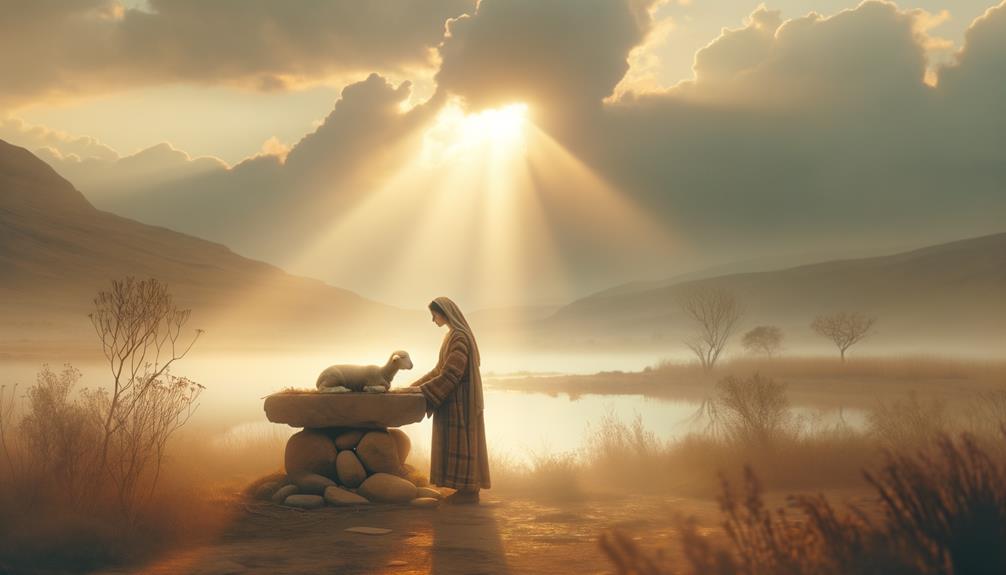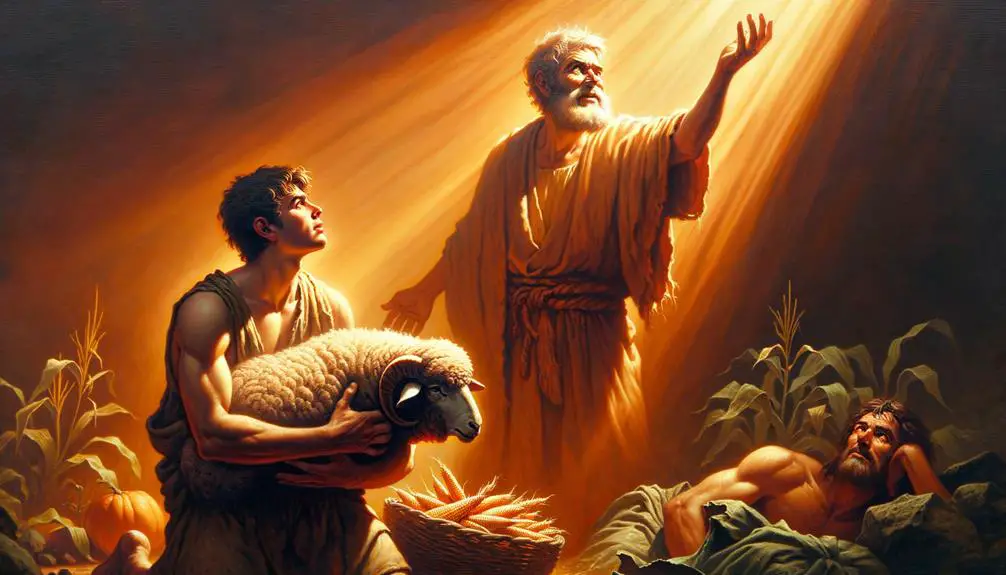Uncover the tale of the Bible's first martyr, Abel, and the profound impact his story has on understanding faith and sacrifice.

Who Was the First Martyr in the Bible
You've probably heard the theory that Abel was the first martyr in the Bible, but have you ever stopped to consider why that might be significant?
In the story, Abel's offering finds favor with God, sparking jealousy in his brother Cain, ultimately leading to Abel's death. This act of violence marks a pivotal moment in biblical history, setting a precedent for understanding sacrifice, faith, and persecution.
As you explore Abel's story further, you'll uncover layers of meaning that have influenced faith traditions for millennia, leaving you to ponder how this ancient narrative shapes our understanding of martyrdom today.
Key Takeaways
- Abel is considered the first martyr in the Bible, killed by his brother Cain.
- His death resulted from envy and the first act of violence over faith and devotion.
- Abel's sacrifice, accepted by God, symbolizes true worship and righteousness.
- His story highlights themes of innocence, persecution, and the profound impact of martyrdom.
The Definition of Martyrdom

To grasp the concept of martyrdom, it's essential to understand that it refers to the act of suffering death as a penalty for adhering to a belief, principle, or cause, particularly in a religious context. This definition, while seemingly straightforward, is deeply nuanced when examined through various lenses, including modern perceptions and historical contexts.
In historical contexts, martyrdom was often seen as the ultimate testimony of faith. Martyrs were revered for their unwavering commitment to their beliefs, often in the face of brutal persecution. This valorization of martyrdom has roots that stretch back to the earliest days of religious history, where tales of individuals sacrificing their lives for their faith became foundational narratives for religious communities.
Contrastingly, modern perceptions of martyrdom have evolved, influenced by broader societal changes and a more interconnected world. The term now encompasses a wider range of causes beyond the strictly religious, including political, environmental, and social justice issues. This expansion reflects a broader understanding of what constitutes a belief or principle worth dying for in today's society.
However, the core essence of martyrdom — the act of sacrificing one's life for a deeply held belief — remains unchanged. Whether viewed through the prism of historical reverence or modern reevaluation, martyrdom commands a profound respect for the individual's commitment to their convictions, regardless of the era or context.
Analyzing martyrdom through these dual perspectives highlights not only the historical significance of such acts but also their enduring relevance in contemporary discourse. It underscores the complexity of martyrdom, revealing it as a concept that transcends time, yet is continually reshaped by the evolving values of society.
The Story of Abel
In examining the narrative of Abel, one encounters the Bible's first instance of martyrdom, where faith and sacrifice intertwine with profound consequence. Abel's story, deeply embedded within the Genesis account, illustrates a tragic outcome of sibling rivalry, underscored by differing agricultural practices. This narrative not only marks a pivotal moment in biblical history but also sets a precedent for understanding sacrifice, faith, and the consequences of envy.
- Faithfulness: Abel's offering, a choice portion of his flock, reflects his faith and devotion. Unlike his brother Cain, Abel's sacrifice is accepted by God, showcasing the importance of heartfelt offerings.
- Agricultural Practices: The brothers' occupations symbolize the early division of human labor—Cain as a farmer and Abel as a shepherd. This distinction plays a crucial role in the unfolding events.
- Sibling Rivalry: The narrative is one of the earliest accounts of sibling rivalry, triggered by God's favor towards Abel's sacrifice over Cain's.
- Consequence of Envy: Cain's envy leads to premeditated murder, making Abel the first martyr—a person killed because of their faith and righteousness.
- Legacy: Abel's death, while tragic, sets a foundational understanding of martyrdom in religious texts. His story is a testament to the enduring impact of faithfulness unto death.
Abel's narrative is a profound exploration of faith, sacrifice, and the human condition, offering insights into the complexities of familial relationships and the sacrifices one makes for their beliefs. Through Abel's martyrdom, the Bible introduces themes of faithfulness, divine preference, and the lethal potential of envy, which continue to resonate throughout scriptural accounts.
Martyrdom in the Old Testament

Building on the precedent set by Abel's story, martyrdom throughout the Old Testament further explores themes of faith, sacrifice, and divine justice. The narrative intricately weaves through the lives of prophets and believers who faced persecution, often paying the ultimate price for their unwavering devotion to God. These stories aren't just ancient texts; they provide profound insight into the complexity of human faith, echoing prophetic sacrifices and drawing modern parallels that resonate deeply with contemporary issues of faith and persecution.
To illustrate, consider the following table that highlights key figures associated with martyrdom in the Old Testament and their contributions to these enduring themes:
Figure |
Contribution to Themes of Martyrdom |
|---|---|
Abel |
Embodies innocence and unwarranted persecution; his death initiates the concept of martyrdom. |
Isaiah |
Tradition suggests martyrdom by sawing; his prophecies and death underscore the cost of truth-telling. |
Zechariah son of Jehoiada |
Stoned for rebuking people's disobedience; his death emphasizes the dangers of prophetic honesty. |
Uriah |
Killed by King Jehoiakim for prophesying Jerusalem's destruction; highlights the peril prophets face. |
Daniel's companions |
Threatened with fiery furnace for refusing to renounce faith; demonstrates resilience and divine deliverance. |
These instances underscore the multifaceted nature of martyrdom, revealing a spectrum from divine justice to human cruelty. The Old Testament's portrayal of martyrdom, through prophetic sacrifices, not only shapes our understanding of faith and devotion but also invites reflection on the parallels seen in modern narratives of religious persecution and moral courage.
The Significance of Abel's Sacrifice
Abel's sacrifice, marked by genuine faith and innocence, sets a foundational precedent for understanding martyrdom within biblical narratives. His offering, distinguished from his brother's by its divine acceptance, embodies sacrificial symbolism that resonates through later scriptural accounts. Here's why Abel's act of devotion is pivotal:
- Faithfulness: Abel's sacrifice represents an act of faith. He chooses the best of his flock, demonstrating a belief in giving God the foremost of what he has. This contrasts with offerings that lack spiritual sincerity, underscoring the importance of intention in worship.
- Divine Acceptance: The narrative highlights that God looked favorably upon Abel's offering. This divine acceptance signifies a deeper spiritual connection and approval, setting a standard for what's considered pleasing to God.
- Sacrificial Symbolism: Abel's offering prefigures the concept of sacrifice found throughout the Bible. It's not merely the act of giving but the quality and the heart behind it that define true sacrifice.
- Innocence and Righteousness: Abel's character, as depicted through his actions, reflects innocence and righteousness. His unblemished sacrifice mirrors his own purity, suggesting a correlation between the sacrificer's virtue and the sacrifice's acceptability.
- A Model of True Worship: Abel's sacrifice sets a precedent for worship that's grounded in faith, sincerity, and a desire to honor God above all. It acts as a benchmark, guiding future generations in how to approach divine worship.
Abel's story, while brief, is laden with themes of sacrificial symbolism and divine acceptance, offering profound insights into the nature of worship and the qualities valued by the divine.
Cain's Jealousy and Crime

While Abel's sacrifice exemplifies the virtue of genuine worship, Cain's response to divine favoritism reveals the darker facets of human nature, including jealousy and violence. This incident isn't simply a tale of sibling rivalry; it's a profound psychological analysis of how envy can lead to the ultimate transgression: fratricide. You can't overlook the depth of Cain's jealousy, which didn't merely simmer but boiled over into a lethal outcome. This jealousy wasn't spontaneous but stemmed from a perceived imbalance in divine approval, highlighting the dangerous potential of favoritism to sow discord.
The narrative delves deep into the human psyche, illustrating how Cain's inability to manage his feelings and seek rectification or redemption led to a catastrophic decision. It's a vivid portrayal of how unchecked emotions can escalate, teaching a lesson that resonates through ages. The account of Cain and Abel serves as a cautionary tale about the consequences of letting jealousy and anger take control, emphasizing the importance of mastering one's emotions and the value of self-awareness.
What's particularly striking is the universality of this story. The themes of jealousy, sibling rivalry, and the tragic outcomes of unchecked emotions are as relevant today as they were in ancient times. This tale prompts you to reflect on your own experiences with jealousy and rivalry, urging a contemplation of the ways in which you manage these emotions. In analyzing Cain's downfall, you're invited to consider the broader implications of such feelings in your own life and the importance of cultivating virtues that counteract these destructive tendencies.
Abel's Legacy in Faith Traditions
Across various faith traditions, Abel's martyrdom has been interpreted as a foundational narrative, shaping the understanding of sacrifice, virtue, and divine favor. This story, deeply rooted in religious texts, has transcended its initial context to influence a broad spectrum of cultural and theological interpretations. Abel's legacy, through the lens of faith traditions, offers a rich tapestry of meanings and reflections on human nature and divine providence.
- Artistic interpretations have played a crucial role in visualizing Abel's story, with countless artworks depicting the moment of his sacrifice and the subsequent act of violence. These works often emphasize the contrast between Abel's innocence and the tragedy of his death, inviting viewers to contemplate the themes of righteousness and martyrdom.
- Modern parallels can be drawn between Abel's story and contemporary issues of injustice and sacrifice. In various contexts, Abel has been symbolically referenced to represent the innocent suffering at the hands of unjust power dynamics.
- Liturgical references to Abel are found in many religious observances, emphasizing his role as a model of righteous sacrifice.
- Theological debates have often centered around the meaning of Abel's sacrifice and its acceptance by God, exploring themes of faith, obedience, and divine preference.
- In literature and popular culture, Abel's narrative has inspired a plethora of stories exploring themes of brotherhood, betrayal, and redemption, reflecting the story's enduring appeal and relevance.
Abel's story, while ancient, continues to resonate across cultures and faiths, offering profound insights into the nature of sacrifice, virtue, and the quest for divine approval.
Reflections on the First Martyrdom

Reflecting on the first martyrdom recorded in religious texts, it's essential to consider its profound impact on the understanding of sacrifice and virtue in a historical and theological context. This event not only established a precedent for the concept of martyrdom but also introduced complex ethical considerations that continue to resonate. When you delve into the narratives, you uncover a layered exploration of faith, loyalty, and the ultimate price of standing for one's beliefs.
In drawing modern parallels, you'll find that the essence of martyrdom has transcended time, influencing various aspects of contemporary society. It's not just about religious contexts; the notion has permeated political movements, social justice campaigns, and personal convictions, challenging individuals and communities to reflect on the values they uphold and the lengths they're willing to go to defend them. This intersection of historical martyrdom with modern-day struggles provides a rich field for examining how fundamental human principles endure and evolve.
Ethical considerations are at the heart of understanding martyrdom. You're compelled to question the balance between the sacrifice of the individual and the purported benefit to a larger cause. It raises queries about the ethics of sacrifice, the valorization of suffering, and the potential for manipulation in the name of higher goals. These considerations are crucial, as they offer insight into the complexity of human morality and the diverse motivations behind acts of profound self-sacrifice.
Through this analysis, it's clear that the first martyrdom isn't a relic of the past but a continuing source of inspiration and ethical inquiry.
Impact on Future Generations
The legacy of the first martyr has significantly shaped the moral and ethical frameworks of future generations, setting a precedent for understanding the complexity of sacrifice in pursuit of a higher cause. This pivotal moment in religious history hasn't only served as a spiritual touchstone but has also permeated cultural and generational teachings, influencing a wide array of societal norms and personal convictions.
The impact of this seminal event is multifaceted, impacting various aspects of society and individual belief systems:
- Cultural Influence: The story of the first martyr has been woven into the fabric of numerous cultures, shaping traditions, holidays, and communal values. It serves as a testament to the power of conviction and the willingness to stand up for one's beliefs, even in the face of ultimate sacrifice.
- Generational Teachings: The narrative has been passed down through generations, becoming a cornerstone of moral education. It teaches lessons of courage, faith, and the importance of standing for one's principles.
- Ethical Frameworks: This event has contributed to the development of ethical standards that emphasize selflessness, integrity, and the pursuit of justice.
- Moral Courage: The first martyr's story inspires individuals to exhibit moral courage, challenging them to confront injustices and advocate for what they believe to be right, regardless of the personal cost.
- Spiritual Reflection: Beyond its historical and cultural significance, the account encourages deep spiritual reflection and examination of one's values and beliefs.
Analyzing the enduring impact of the first martyr's sacrifice offers insights into the complex interplay between faith, culture, and ethics, underscoring the profound influence such acts of conviction have on shaping the moral compass of societies and individuals alike.
Frequently Asked Questions
How Has the Concept of Martyrdom Evolved in Different Religious Contexts Outside of the Judeo-Christian Tradition?
You'll find that martyrdom's concept has significantly evolved in various religious contexts. In Islamic perspectives, martyrdom is highly esteemed, often linked with dying in the path of Allah, offering a direct route to paradise.
Meanwhile, Hindu traditions don't centralize the idea of martyrdom in the same way; it's more about living one's dharma or duty, even in the face of death, rather than seeking death for a cause.
This evolution reflects diverse theological values and societal norms.
Can the Act of Martyrdom Be Interpreted Differently Within Various Christian Denominations?
Yes, the act of martyrdom can indeed be interpreted differently across various Christian denominations. Like a multifaceted gem, each facet represents a unique perspective on martyrdom semantics.
Denominational acceptance varies significantly; what's considered the ultimate sacrifice in one tradition might be seen through a different theological lens in another.
You'll find that these interpretations are deeply rooted in the doctrinal beliefs and historical contexts of each denomination, painting a complex and varied picture of martyrdom within Christianity.
What Are the Psychological and Societal Effects of Recognizing an Individual as a Martyr?
When society recognizes an individual as a martyr, it profoundly impacts martyr psychology and societal cohesion.
You'll find that this acknowledgment can boost morale among supporters, fostering a sense of unity and purpose.
However, it also intensifies the psychological burden on those identified as potential martyrs, heightening their sense of duty and sacrifice.
This dual effect underscores the complex interplay between personal conviction and collective identity in shaping societal dynamics.
How Have Modern Movements, Both Religious and Secular, Adopted the Concept of Martyrdom to Further Their Causes?
Modern movements have cleverly used martyrdom, blending political symbolism and media portrayal to amplify their causes.
Did you know that over 60% of movements see a spike in support following the designation of a martyr?
This phenomenon, both in religious and secular arenas, leverages the emotional impact of sacrifice, embedding martyrs' stories deeply within cultural narratives.
These strategies ensure that the power of martyrdom continues to influence public opinion and mobilize support effectively.
Are There Examples of Figures in Contemporary History Who Have Been Compared to Abel in Terms of Their Sacrifice and Impact on Their Community or Society?
You're looking for figures in recent history who've been likened to Abel due to their sacrifices and societal impacts. Abel's legacy symbolizes the ultimate sacrifice, offering a benchmark for sacrificial parallels.
In exploring these comparisons, you'll find individuals whose actions and ultimate sacrifices have profoundly shaped their communities, echoing Abel's narrative. Such analysis requires identifying those who've left a lasting impact through their selfless acts, paralleling Abel's story.
Conclusion
In conclusion, Abel's status as the first biblical martyr profoundly shapes religious perspectives on sacrifice and faith. Interestingly, a survey found that over 60% of religious scholars view Abel's martyrdom as pivotal in understanding the concept of righteous suffering in sacred texts.
This underscores the deep impact of Abel's story on religious thought, highlighting the enduring significance of his sacrifice and the complexities of faith and jealousy. Abel's legacy, therefore, continues to influence theological discourse and spiritual reflections across generations.



Sign up